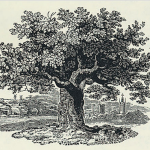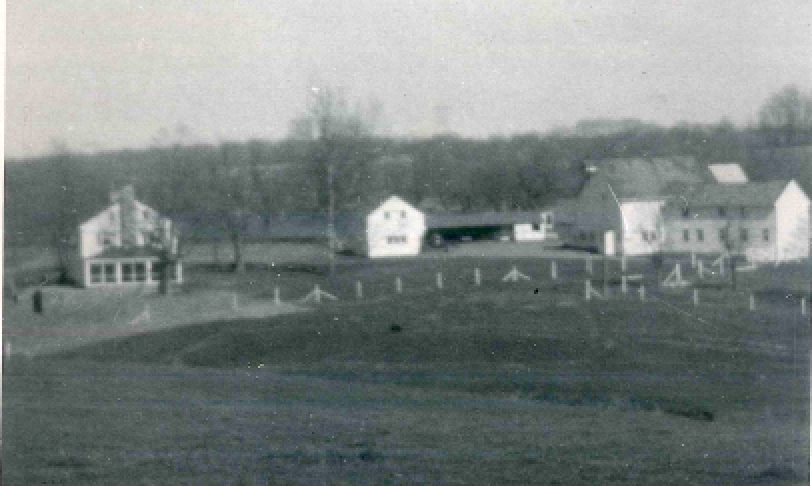The Van Dolah Farm
Recently I asked if anyone recognized this photo. It didn’t take long for readers to answer the question, as you can see from the comments below.
Recently I asked if anyone recognized this photo. It didn’t take long for readers to answer the question, as you can see from the comments below.
First Trip to Delaware River Kilns an Experience for a Boy
Spoke Making a Lost Trade
by Egbert T. Bush, Stockton, N. J.
published in the Hunterdon Co. Democrat, April 21, 1932
 In recognition of the belated arrival of spring, I offer Mr. Bush’s tale of how farmers got lime for their fields in the mid 19th-century. And among those “Other Things,” Mr. Bush describes the business of spoke making.
In recognition of the belated arrival of spring, I offer Mr. Bush’s tale of how farmers got lime for their fields in the mid 19th-century. And among those “Other Things,” Mr. Bush describes the business of spoke making.
As our forests were cut off and the stumps rotted away, the land was found to be or soon to become more or less sour. The sorrels began to grow plentifully, especially the tall, reddish brown one that we called “horse sorrel.” That was later known as a sure indication that the land needed lime, tho in the earlier stages little was known about sour land or the indications, or even about lime as a sweetener. Such knowledge, like almost every other kind, grew gradually with experience and observation, until science took hold of such matters and showed us to be sometimes on the right track without knowing exactly why.
Of all the one-room schools in Delaware Township, none seems to have inspired more devoted attachment than the Van Dolah School. The number of graduates was large, and many of them were highly accomplished in later life. It was probably one of the best photographed schools in the county. I have included many of them here.
Postscript to “Asa Romine’s Beloved Farm“
Some time ago I got a copy of an article in the Democrat-Advertiser of 1902. Actually, copies of several articles, but I neglected to file them in any useful way. Today, I stumbled across this particular article and immediately regretted not having it at hand when writing about Asa and Sarah Romine. It is a celebration of their long married life, probably written by Jonathan M. Hoppock. Here it is:
My original intention was to publish an article by Jonathan M. Hoppock on the history of the Baptist Church in Locktown. And that is what I will do here, but after reading his article, I discovered that some of the ministers he listed had troubled careers, and that, of course, makes them interesting. But first, here is Mr. Hoppock’s history of the Church.
I got a letter today from Joan Verity of Frenchtown who wondered about the history of the Methodist Church in Rosemont. It was built in 1860, but only lasted about 20 years.
Charles Cane purchased the building in 1948 and renovated it to serve as housing for his employees. Phil Cane still has a news article about the work that was done, and the bell that once hung in the church steeple can now be seen in the Cane Farm parking lot.
The original version of this post, published on March 14, 2015, has been significantly revised because of new information I have received. Most of these revisions concern Jonas Thatcher, Jr. Consider this Chapter One of the History of the Sergeantsville Inn.

Lora Olsen, clerk of West Amwell Township, got in touch with me recently to see if I knew where this farm was located. She had some reason to think it might have been the farm once owned by George Trout. The Trout family lived on the farm just south of the tract of land owned first by the Robins, and later by the Buchanan family. I wrote about the location of that farm here.
Back in February, I published an article on the cemetery connected with the Locktown Baptist church. Previously I have written about the Baptist congregation here as well as the Locktown Christian Church and its Cemetery. It seems appropriate now to include Mr. Bush’s own history of this neighborhood, which was published in the Hunterdon Democrat, on May 22, 1930. Along with the churches, Mr. Bush discusses the school house, the distillery and the Locktown Hotel, which began its life as a humble tavern, and also some of the old families, like the Chamberlins, Heaths, Lairs, Rittenhouses, Smiths and Suttons. Photographs in this article were provided by Paul Kurzenberger.
Having published Mr. Bush’s article, “The ‘Oregon’ and Other Schools,” and then a follow-up on Duck’s Flat, I thought I was done with this neighborhood for now. But I recently found another article by Mr. Bush continuing the story of Ducks’ Flat school. This article has allowed me to identify the mystery school I referred to previously, located down the road from the Ducks’ Flat school that Mr. Bush was familiar with. But I’ll wait until Mr. Bush has concluded before explaining.